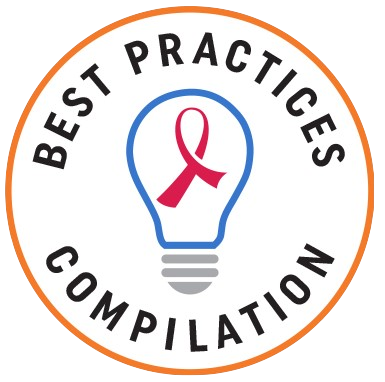The RWHAP Best Practices Compilation gathers and disseminates interventions that improve outcomes along the HIV care continuum. Explore the Compilation to find inspiration and new ideas for improving the care of people with HIV. Learn more about the Best Practices Compilation and submit your innovation today for possible inclusion.
Search Results
Displaying 1 - 10 of 109
The intervention integrated supportive employment services, housing services, and HIV care for clients receiving case management services and with unmet housing and employment needs. Evaluation of the program showed improvements in employment rates, participant confidence in being able to hold onto a job, household median income, participants’ living situations, and self-perception of homelessness status.

Emerging Intervention
People who are unstably housed; People with HIV
Beyond the care continuum
Support service delivery model; Data utilization approach
Paterson, NJ
The STEP Program is a multidisciplinary intra-campus health care transition program to support youth with HIV as they transition from pediatric to adult HIV care using individualized transition plans. Ninety-five percent of youth enrolled in STEP were still retained in adult care at 12 months compared to only 50% of a pre-STEP cohort.

Evidence-Informed Intervention
Youth ages 13 to 24
Retention in HIV medical care
Clinical service delivery model; Systems/structural interventions
Baltimore, MD
The Arizona Department of Health Services partnered with three clinics to identify people with a dual diagnosis of HIV and HCV, determine their care needs, and link them to HCV treatment.

Emerging Intervention
People with HCV
Beyond the care continuum
Data utilization approach; Outreach and reengagement activities
AZ
Through the Test & Treat Rapid Access (TTRA) Program, clients with a new HIV diagnosis in Miami-Dade County can access ART, receive other services and counseling, start enrolling in RWHAP, and connect to HIV primary care during the initial visit. At Borinquen Health Care Center, one of the clinical sites participating in TTRA, 76% of clients were virally suppressed within three months of receiving a rapid ART start, and 95% were retained in care for 12 months.

Evidence-Informed Intervention
People with a new diagnosis of HIV; People with HIV who are not in care
HIV diagnosis; Linkage to HIV medical care; Prescription of antiretroviral therapy; Viral suppression
Clinical service delivery model
Miami-Dade County, FL
Through the Practice Transformation Project, the Native American Community Clinic and Midwest AIDS Education and Training Center developed strategies to increase testing and linkage to care within the American Indian/Alaska Native population, and for those who inject drugs and are experiencing homelessness. These ongoing efforts have increased HIV testing rates by 10 percentage points through harm reduction, community outreach, and culturally sensitive strategies.

Emerging Intervention
American Indian/Alaska Native people; People who inject drugs (PWID); People who are unstably housed
HIV diagnosis; Linkage to HIV medical care
Clinical service delivery model
Minneapolis, MN
OPT-In For Life is a social media-based intervention that promotes advancement along the HIV care continuum for young adults (ages 18 to 34) with HIV. During the 18-month intervention, OPT-In For Life used multiple social media platforms and a mobile application to provide HIV-related and positive lifestyle resources. Young adults enrolled in OPT-in For Life demonstrated improved retention in HIV care and higher rates of viral suppression after participation.

Evidence-Informed Intervention
Young adults ages 25 to 34; Youth ages 13 to 24
Retention in HIV medical care; Viral suppression
Use of technology and mobile health
PA
Stronger Together uses counseling to increase engagement in and improve the quality of HIV care available for serodiscordant male couples. Through three in-person and additional “booster” sessions over an 18-month period, Stronger Together gave couples a space to work with an HIV professional to improve treatment adherence and keep both people healthy. Stronger Together participants were more likely to adhere to ART than those in a control group.

Evidence-Based Intervention
People with HIV; Gay, bisexual, and other men who have sex with men (MSM)
Prescription of antiretroviral therapy
Clinical service delivery model
Atlanta, GA
Boston, MA
Chicago, IL
CoRECT was a data to care project to identify and reengage people with HIV who were newly out of care. It included a clinic and health department data reconciliation process to identify missed laboratory results or appointments and create the out-of-care list, case discussions via telephone to review the combined list, and field epidemiologist outreach to assist clients with making appointments, securing transportation, and arranging referrals. The intervention employed strengths-based case management techniques and motivational interviewing to contact identified people within 30 days, reengage them in care, and reduce time to viral suppression.

Evidence-Based Intervention
People with HIV who are not in care
Linkage to HIV medical care; Retention in HIV medical care
Outreach and reengagement activities; Data utilization approach
MA
CT
Philadelphia, PA
The YGetIt? Program engaged youth and young adults with HIV in care through three components: a health management mobile application (GET!), Peer Engagement Educator Professionals (PEEPs), and a graphic serial (Tested). Tested received over 200,000 views, and viral suppression rates among YGetIt? participants increased from 79% to 86% over the course of the program.

Emerging Intervention
Youth ages 13 to 24; Young adults ages 25 to 34
Viral suppression
Use of technology and mobile health
Long Island , NY
Rapid ART Program Initiative for New Diagnoses (RAPID) was designed to connect people with a new HIV diagnosis to ART within five days of diagnosis and within one day of their initial care visit. Linkage navigators counseled people on HIV care, identified an available clinician capable of immediately prescribing ART, scheduled the clinical appointment, and connected people to additional support services. RAPID led to a reduction in median time between initial diagnosis and both ART initiation and viral suppression.

Evidence-Based Intervention
People with a new diagnosis of HIV
Linkage to HIV medical care; Prescription of antiretroviral therapy; Viral suppression
Clinical service delivery model
San Francisco, CA






